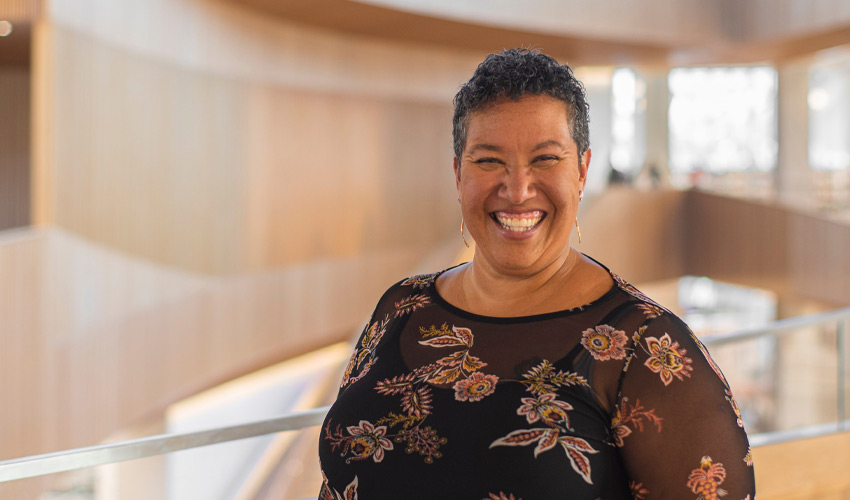
Shereen Samuels, director of student services for the Students’ Association of Mount Royal University (SAMRU).
Shereen Samuels attended Mount Royal College in the ‘90s, and recently completed a master’s in professional communication at Royal Roads University with a research focus on meaningful inclusion in organizations. She has worked for the last 15 years for the Students’ Association of Mount Royal University (SAMRU). Samuels also does freelance consulting and facilitation through EDIfy, an equity, diversity and inclusion consulting firm which she co-founded with Mount Royal College alumnus Brendan Correia, who is also the director of Marketing and Communications for SAMRU.
We are on the crest of a cultural moment that’s current, and yet not at all new. The past few years have seen a tidal wave of voices from marginalized communities seeking equity and social justice. Many leaders are grappling with how to harness the momentum of movements like #BlackLivesMatter to create more equitable and inclusive workplaces.
For many years, companies took the approach of trying to train inclusive attitudes into employees through the delivery of diversity, sensitivity and bias training. Today, organizations increasingly understand that they must do the work of searching out and dismantling the barriers to inclusion and equity that are embedded in their organizational structures and processes.
This work is not simple or easy, and skillful leadership is a must. The good news is that, if you are able to create a diverse and inclusive workplace, you will also create a high-performing organization with staff who are loyal to the principles and values that your workplace practices demonstrate every day.
In my research on creating inclusive organizations, I identified three aspects of high-performing inclusive organizations that make an individual feel meaningfully included in their workplace: personal opportunity, social belonging and organizational citizenship. Here are some ideas and recommendations for you to consider to create positive change in these areas.
Personal opportunity
Personal opportunity encompasses all of the activities and opportunities that allow an individual to grow and feel success and satisfaction in their work life. For many organizations, the barriers to personal opportunity begin with getting diverse candidates through the door, so a good place to start is by strengthening your company’s hiring practices. Start by ensuring that hirers understand and have actions in place to mitigate cognitive bias; for example, blind resume reviews with names removed, as well as clearly developed skills matrices that minimize the amount of personal judgement impacting the selection process.
Even more importantly, however, expand your company's recruitment practices beyond the usual search processes. For instance, instead of hiring a search firm or simply posting on job search websites, consider building relationships with diverse local community connectors or hubs, and utilize their expertise and community connections to reach the audiences that are currently eluding you. (You could also build relationships with a local search firm that is willing to engage in this kind of collaborative network building themselves.)
Social belonging
Social belonging refers to all the tangible and intangible experiences that make an individual feel fully seen and appreciated. It’s about creating a sense of belonging and safety within the formal and informal interactions of the work environment. This is an area where the actions of leaders are critically important in developing organizational culture.
Enriching employees’ social belonging can include creating mentoring programs and ensuring that professional development practices encourage and reward employees who are committed to growth. It can include having clear policies and procedures articulating organizational attitudes to inclusion, ranging from Indigenous cultural disbursement procedures to inclusive washrooms to flexible childcare support. COVID-19 has taught us all how to be more flexible in our work conditions, and flexibility is key in supporting personal opportunity for all individuals. What aspects of flexible work structures might you consider keeping around once the pandemic ends?
Leaders can also incentivize individuals throughout the organization to co-create the change they are looking for, such as setting up in-house peer-based teaching opportunities that celebrate the skills and competencies of your staff while encouraging them to mentor each other.
Organizational citizenship
Organizational citizenship means giving individuals the proven ability to make a meaningful difference in their work and can be cultivated at every level of an organization. It is typified by an openness to change, allowing new ideas and perspectives to shape the work of the team, providing the ability to share these new practices at leadership tables, and amplifying and giving appropriate credit to voices that are traditionally dismissed or diminished. For example, one practice might involve building an explicit organizational culture around design thinking, which encourages a continuous innovation approach that allows space for staff to contribute new ideas.
Dismantling barriers to organizational citizenship can also involve reaching out to build relationships with equity-seeking communities that are invested in the success of your organization because it aligns with their success. This overlaps with the community networking idea mentioned above. The more you walk your talk in reaching out and listening to diverse communities, the more you’ll reap the benefits of those communities seeing you as an ally, potential partner and inclusive workplace.
By courageously identifying the ways in which your organization is falling short in these three aspects and working diligently to dismantle these barriers and fill these gaps, you can align your daily leadership efforts with the movement towards a more just society. How inspiring is that?